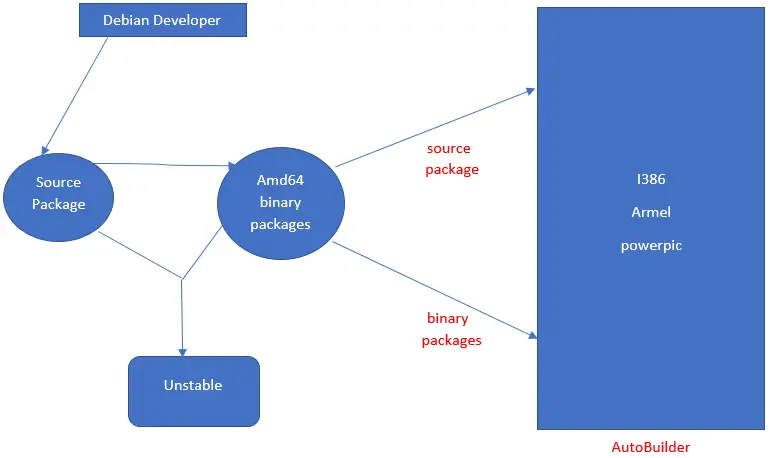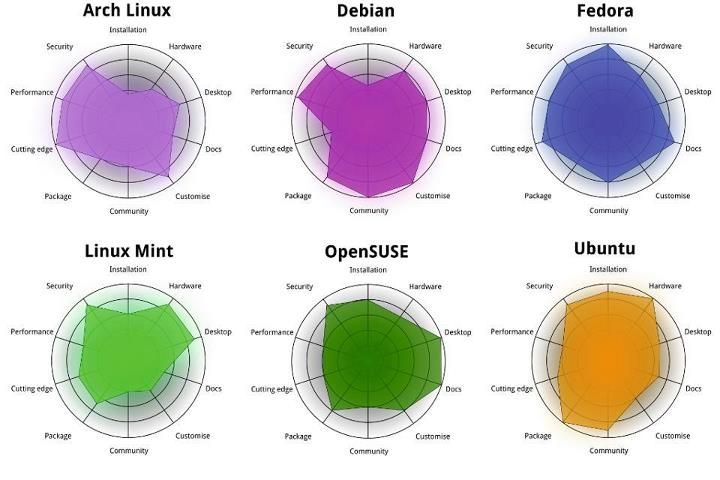Debian vs. Arch Linux: A Clash of Philosophies

Debian and Arch Linux are two of the most popular Linux distributions, but they take very different approaches to software management and user experience. Debian is a stable distribution that focuses on reliability and security. Arch Linux is a rolling release distribution that focuses on flexibility and customization.

Software Management

Debian uses a package management system called APT (Advanced Package Tool). APT allows users to install, update, and remove software packages from a central repository. Debian’s repository is very large and contains a wide variety of software, including both free and open source software and proprietary software.
Arch Linux uses a package management system called Pacman. Pacman is a very simple and fast package manager that allows users to install, update, and remove software packages from a central repository. Arch Linux’s repository is much smaller than Debian’s, but it contains a wide variety of software, including both free and open source software and proprietary software.
User Experience
Debian is a very stable distribution that is designed to be easy to use and maintain. Debian’s user interface is very traditional and easy to navigate. Debian also has a very good documentation system that makes it easy to learn how to use the distribution.
Arch Linux is a very flexible distribution that is designed to be customized to the user’s needs. Arch Linux’s user interface is very minimalist and can be difficult to navigate for new users. Arch Linux also has a very limited documentation system, which can make it difficult to learn how to use the distribution.
Which Distribution is Right for You?
If you are looking for a stable and reliable distribution that is easy to use, then Debian is a good choice. If you are looking for a flexible and customizable distribution that gives you more control over your system, then Arch Linux is a good choice.
Here is a table that summarizes the key differences between Debian and Arch Linux:
| Feature | Debian | Arch Linux |
|---|---|---|
| Stability | Stable | Rolling release |
| User Interface | Traditional | Minimalist |
| Documentation | Good | Limited |
| Package Management | APT | Pacman |
| Repository Size | Large | Small |
| Customization | Limited | Flexible |
| Support | Good | Limited |
Executive Summary
Debian and Arch Linux represent starkly different philosophies in the Linux distribution landscape. Debian prioritizes stability and conservative package management, while Arch Linux values rolling releases, user customization, and bleeding-edge software. Understanding these fundamental differences is crucial for choosing the distribution that aligns with your technical preferences and workflow requirements.
Introduction
The world of Linux distributions offers a vast array of choices, each catering to specific user needs. Among the most popular and influential distributions are Debian and Arch Linux, which embody contrasting approaches to software management and user experience. Debian upholds stability and security, whereas Arch Linux embraces flexibility, customization, and cutting-edge software. This article delves into the core differences between these two Linux stalwarts to help you make an informed decision about which distribution suits you best.
Package Management
Debian:
- Conservative Release Model: Debian employs a stable release model, meaning new releases undergo rigorous testing before becoming available.
- Package Management via APT: Debian utilizes Advanced Package Tool (APT) for package management, providing a user-friendly interface for installing, updating, and removing software.
- Extensive Software Repository: Debian boasts a vast repository of software packages, catering to diverse user needs and requirements.
- Focus on Stability and Security: Debian’s conservative release model prioritizes stability and security, ensuring minimal disruptions and vulnerabilities.
- Pre-compiled Binary Packages: Debian packages are pre-compiled, making installation and maintenance relatively straightforward.
Arch Linux:
- Rolling Release Model: Arch Linux follows a rolling release model, continuously updating packages instead of releasing major versions.
- Package Management via Pacman: Arch Linux employs Pacman as its package manager, providing a lightweight and flexible tool for managing software.
- Access to Bleeding-Edge Software: Arch Linux offers early access to the latest software releases, ideal for users seeking cutting-edge technologies.
- Emphasis on User Customization: Arch Linux empowers users with extensive customization options, allowing them to tailor their system to their specific preferences.
- AUR (Arch User Repository): The Arch User Repository (AUR) extends the official repository with community-developed packages not found elsewhere.
User Experience
Debian:
- Stability and Predictability: Debian provides a highly stable and predictable user experience, minimizing the risk of sudden changes or disruptions.
- Extensive Documentation and Support: Debian has a vast and active community that provides ample documentation, forums, and other support resources.
- Lean and Resource-Efficient: Debian’s focus on stability often results in a leaner operating system with a reduced memory footprint.
- Suitable for Servers and Desktops: Debian is well-suited for both server and desktop environments, offering reliable and versatile performance.
- Long-Term Support: Debian releases receive extended support, ensuring availability of security updates and maintenance for several years.
Arch Linux:
- Higher Learning Curve: Arch Linux’s advanced customization and rolling release model require a higher level of technical understanding and maintenance effort.
- Customization and Flexibility: Arch Linux provides unparalleled customization options, enabling users to mold their system according to their unique needs and preferences.
- Cutting-Edge Software: Arch Linux offers early access to the latest software, catering to users who value staying at the forefront of technological advancements.
- Community-Driven Support: Arch Linux relies heavily on its active community for support, which can be accessed through forums, wikis, and mailing lists.
- AUR Extensibility: The AUR provides a vast repository of community-developed packages, further expanding the software ecosystem available to Arch Linux users.
Support and Community
Debian:
- Extensive Community Support: Debian benefits from a庞大的community of users and developers who provide extensive support and documentation.
*Stable Release Cadence: Debian’s stable release model minimizes the need for frequent hardware or software updates, reducing the workload on users and system administrators. - Regular Security Updates: Debian provides timely security updates for both stable and testing releases, ensuring ongoing security maintenance.
- Corporate Support: Debian’s stability and reliability make it a popular choice for corporate and enterprise environments that prioritize uptime and predictability.
- Long-Term Stability: Debian releases receive extended support for several years, guaranteeing long-term availability and stability for critical systems.
Arch Linux:
- Active Community: Arch Linux’s active community provides a wealth of support and documentation through forums, wikis, and mailing lists.
- AUR Contributions: The AUR enables users to contribute their own software packages, expanding the available software生态系统.
- Rolling Release: Arch Linux’s rolling release model ensures a continuous flow of updates, reducing the need for major system upgrades.
- User Customization: Arch Linux’s emphasis on userCustomization allows users to fine-tune their systems to meet specific requirements and preferences.
- Bleeding-Edge Software: Arch Linux provides access to the latest software releases, catering to users who value staying at the forefront of technological advancements.
Conclusion
Choosing between Debian and Arch Linux ultimately depends on your specific needs and preferences. Debian’s stability and conservative approach make it an excellent choice for users seeking a reliable and low-maintenance operating system. Arch Linux, on the other hand, offers unparalleled customization and access to bleeding-edge software, appealing to power users who value flexibility and the latest technologies. Understanding the underlying philosophies and differences between these distributions will empower you to make an informed decision and select the distribution that best aligns with your technical goals and workflow requirements.
Keyword Phrase Tags
- Debian vs Arch Linux
- Linux Distributions
- Package Management
- Stability vs Customization
- Rolling Release vs Stable Releases

Debbian is absolutely the best and Arch absolute the wors. Never use Arch.
I agree with Arch user bellow Debian is unuseful.
This article failed to tell why extactly Arch and debian have different filsophies.
which one do you prefer and why? I think arch is the great.
I disagree. I think that Debbian is very very slow and boring.
I think in fact that Arch is the best distrubution, because is the newest and looks more powerfull.
I would like to know if the author has ever used Debian, because there are some fact errors.
I am trilled by this. Debian is the best.
if you dont like don’t use it. because arch is fantastic
Maybe the writer could have done a little more research before putting pen to paper ?
if you won’t use arch you live out of time. Here is still 1999.
If the author spend less time on trolling on arch. he could maybe write the half of the truth!
It would be great if the author could just stick to the facts and not try to be funny.
The author is soooooooo funny, I love the way he jokes about Arch.
I think the author did a great job of explaining the different philosophies of Debian and Arch Linux.